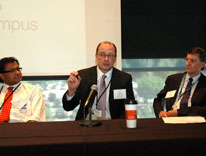
By Chris Casey | University Communications
AURORA, Colo. - The scientific discoveries and clinical applications occurring at the Anschutz Medical Campus are pushing the nation's frontiers in biomedicine and patient care.
That was the message members of the ARCS Foundation -- Achievement Rewards for College Scientists -- heard during a campus visit June 1 as part of the group's national meeting in Denver.
About 70 ARCS members attended the morning program "New Frontiers in Biomedicine" in the Trivisible Room in Research 2. The program included an introduction by Lilly Marks, vice president for health affairs and executive vice chancellor of the Anschutz Medical Campus, and a panel discussion featuring Richard Duke, PhD, associate professor, division of Medical Oncology, School of Medicine; Robin Shandas, PhD, professor and chair of the Bioengineering Department, College of Engineering and Applied Science; and Andrew Thorburn, PhD, professor and chair of the Pharmacology Department, School of Medicine. Also featured was keynote speaker Charles Dinarello, MD, professor, School of Medicine, with an introduction by Richard Krugman, MD, dean of the School of Medicine.
ARCS has 17 chapters across the country. The organization, made up of women philanthropists, offers scholarships to students pursuing graduate degrees in math, science and engineering.
Marks gave ARCS members an overview of the Anschutz Medical Campus and thanked them for their scholarship support nationally and to the students at CU Anschutz.
"Our ability to combine basic research discovery with clinical problems is what gives the work relevance, and the creation of new drugs, devices and therapies is what gives this work true impact," Marks said. "... ARCS plays an important role in building the pipeline for talented new scientists in medicine and the broad array of scientific fields."
Shandas explained that the Bioengineering Department has about 60 graduate students who benefit from direct access to physicians. Some students have launched companies because of their ability to talk to physicians and create devices that help them, Shandas said.
"The reason we're on this campus and the reason we can be innovative is because we have these strong interactions and communications with the people who are actually treating patients and doing basic science," Shandas said.
Thorburn, who is deputy director of the CU Cancer Center, said cancer research is at the forefront of the movement toward personalized therapies. Because success rates in drug treatments are low, "you've got to understand the biology that you're targeting before you made your drug, so that when you make your drug you can select the right group of people and the right subgroups of patients for all of your studies," he said. "Personalized medicine only works if you have personalized drug discovery, personalized drug development and personalization the whole way through the spectrum."
Duke, who is a biotechnology executive, inventor and entrepreneur, spoke about the economic challenges of funding drug development in the intermediate phase between discovery and clinical application, what is referred to as the "Valley of Death."
He said drug development is very expensive and risky. In that vein, he founded the Colorado Institute for Drug, Device and Diagnostic Development. "The goal is to try to do that early stage thing -- look at private-public partnerships to move things quicker into the clinic and create companies," Duke said.
The panelists emphasized that although the challenges and costs in advancing medicine and care are many, this is a time of great opportunity in the biosciences.
"We want the cleverest people to be doing this sort of work, and we have to remember that we are poised to do very, very exciting things," Thorburn said.
(Photo: From left, panelists Robin Shandas, PhD, Andrew Thorburn, PhD, and Rick Duke, PhD, speak to ARCS Foundation members on June 1 at the Anschutz Medical Campus)
Contact: christopher.casey@ucdenver.edu
